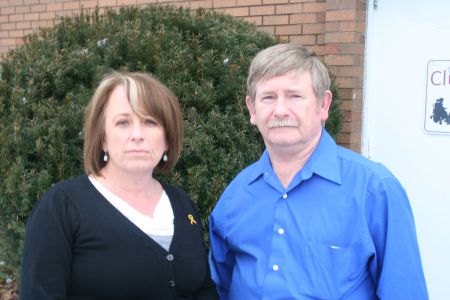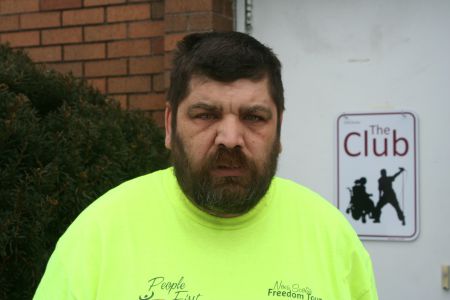K'JIPUKTUK (Halifax) - Amanda Murphy is a 34-year-old woman with developmental disabilities. In early February she will be sentenced in Antigonish for allegedly pushing and striking an employee of the institution where she lives.
Soft-spoken Victor Murphy, the father of 34 year old Amanda, suggested at a press conference in Halifax that his daughter does not belong in the criminal justice system.
The press conference was organized by People First Nova Scotia and Advocating Parents of Nova Scotia to draw attention to the plight of citizens with special needs who are caught up in the criminal justice system.
"Amanda is just a child, but now she is being treated as a criminal," said Murphy. "She can't help what she does. She is not a murderer, she is just a child trapped in a woman's body. They look and they see this grown woman, but they don't realize that she has the capacity of a five- to eight-year- old."
Also at the press conference was Brenda Hardiman, mother of Nichele Benn, and co-founder of Advocating Parents Nova Scotia, an organization that helps parents of children with special needs navigate the system.
Similarities between Amanda Murphy and the Nichele Benn case are striking. Nichele, who also faces assault charges, has an organic brain disorder that causes her aggressive episodes. And like Amanda Murphy, Nichele has been convicted of assault charges before.
A third case was also briefly mentioned at the press conference. Richard Rector suffered brain injuries after an ATV accident while in his teens. Since his accident he experiences periodic episodes of aggressive behaviour. He too was charged with assault.
People First Nova Scotia and Advocating Parents believe that the criminal justice system is not the place to deal people like Amanda, Nichele, and Richard.
"If Nichele is incarcerated her behaviour will not change, in fact it would worsen," said Hardiman. "If Nichele were to strike out at a prison guard out there she would be charged with assault [again], and her incarceration would be extended."
"It's not a learning curve, it's a health issue," said Hardiman.
Murphy is very worried about what the future will bring for his daughter, who is still on probation.
"The only thing I want to say is that Amanda has the capacity of a five- to eight-year-old. So what do you do, you put somebody like that in jail?," asked an exasperated Murphy.
Murphy said that his worries are further aggravated because he doesn't know who willl stand up for his daughter when he and his wife are no longer able to.
Hardiman, Nichele's mother, believes that a change in caretaker protocol initiated by Community Services is the direct reason for Nichele's encounters with police and the criminal justice system.
Nichele, who is a resident of Quest, a large residential rehabilitation centre in Lower Sackville, used to live in a much more intimate setting, says Hardiman. Effective use of a therapeutic quiet room allowed Nichele's caretakers at the time to manage Nichele's aggressive episodes without any need for police intervention.
However, Hardiman said, all that changed when the Department of Community Services disallowed the use of the therapeutic quiet room and advised Nichele's caretakers to call the police any time Nichele's aggression could not be managed.
"So that's when things changed for Nichele; since then she has seen many police interventions, criminal charges, and she has been incarcerated," said Hardiman.
Speakers at the press conference called for bettter training for staff of group homes and institutions.
Cindy Carruthers, a coordinator at People First Nova Scotia, believes that the calling of police and the laying of criminal charges is a relatively new phenomenon.
"When I was a front-line worker [..] we were trained to come up with solutions and be innovative. It is very challenging, each individual has their own unique needs. Staff were trained to think outside the box," said Carruthers. "Maybe the province should look at those homes that are very successful with that approach and model after those."
There was also agreement among the speakers that criminalization of people with special needs is much more common than many people assume.
Carruthers mentioned that at the Nichele Benn support rallies held earlier this month in Lower Sackville and elsewhere many people spoke of similar experiences.
"It scares me to think how many people are in jail who are just like that. And how many more are out there," said Hardiman.
Elizabeth MacDonald, spokesperson for the Department of Community Services writes in an email dated January 20th that police are rarely called and "only as a last resort, in situations of imminent danger." Policies are not set by the Department but are up to the care-giving facilities.
This response does not impress Hardiman.
"To me it's just passing the responsibility on to somebody else," says Hardiman. "Community Services places these people in these homes, so they would have some say how these people are managed."
David Kent, self-advocate for people labeled with an intellectual disability, and vice president of People First Nova Scotia, believes that there must be a better way to deal with these violent incidents in group homes and institutions.
Familes and self-advocates have to work with government and disability organizations to come up with better ways to support people with special needs, Kent argued.
"We as a community must begin to look at citizens with special needs as family. It could be your son, or daughter, or grandchild. Would you want their needs to lead to arrest and jail? Just stop and think for a moment," Kent said.
People First Nova Scotia and Advocating Parents of Nova Scotia are organizing demonstrations in support of Nichele Benn, Richard Rector, Amanda Murphy and others like them. These rallies are scheduled for Sunday February 2nd in Halifax, New Minas, Truro, Windsor, Yarmouth and possibly other towns as well. A rally is scheduled in Antigonish on Thursday February 6th, the day that Amanda Murphy is to be sentenced.
Follow Robert Devet on Twitter @DevetRobert





